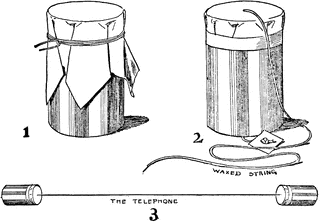You know the telephone game. Everyone sits in a circle. The first person whispers a secret to their neighbor, “I like to eat mushroom pizza.” And by the the time it circumnavigates the group it’s morphed into something like,
“I liked to beat up my lunchroom teacher” or
“I spiked a peach with a much hewn tweezer” or
“I might repeat a little hummed tune feature” or
“Go Osprey!” or
“Pomegranate juice” or
“Dole/Kemp ’96” or
“I run my unit how I run my unit. You want to investigate me, roll the dice and take your chances. I eat breakfast 300 yards from 4000 Cubans who are trained to kill me, so don’t think for one second that you can come down here, flash a badge, and make me nervous.”
You have to have a pretty big (and disturbed) group to get to something like the last one. But, it happens.
The media is a lot like a telephone game. Especially on legal matters. There’s sort of the original source material. A Supreme Court opinion. Or a piece of legislation. Or a speech. By the time, we get it, it’s something akin to reading off the back of a Raisin Bran cereal box to learn how to open a chateau and vineyard.
There are a lot of unsettling things about the NSA tracking our phone calls. But, somewhere in all of this we’ve forgotten something:
Phone calls aren’t very private.
Indeed, as a purely constitutional matter, they aren’t at all.
Think of constitutional protections as a floor or, rather, the minimum amount of protection the government will extend regarding any particular right. I don’t mean to say that they are minimal, simply that you get at least that much. In other words, you can imagine ways that a right, say to assemble, might be expanded — the right to assemble and then to receive free of charge ballet instruction for 6 months, let’s say.
And, indeed, in many cases, those minimum protections have been expanded by Congress and state legislatures, through statutory action, to protect people more.
Telecommunications is one such area.
The right against unlawful searches found in the Fourth Amendment has never been very effective in protecting our phone conversations.
The Constitution has been fairly consistently interpreted to not extend any expectation of privacy in information we convey to third parties. In other words, when you call someone, you have elected, maybe unwittingly, to convey not only information about the call to the phone company and other service provides, but you have literally conveyed the substance of your conversation to another person — on the other end of the line. And, no matter how dear your mom or hot and committed your boyfriend, you have no assurances that they will not disseminate details of your freshman year homesickness or desperate confession of love to the world. As a result, the United States Supreme Court has concluded that whatever subjective expectation you think you have — that the contents of the call will be kept private — is not reasonable. And, therefore, it is not a private act, subject to the Fourth Amendment protection against illegal searches. There is no search. You shared it.
Of course, Congress and the States have added some protections in this respect regarding wiretapping etc. And, certainly private companies, with good capitalistic instincts at play, have made certain contractual promises to their telecommunications or internet clients not to disseminate private information. But, remember, these are EXTRA. We don’t deservere them as a constitutional matter.
Even some of our congress persons as they debated last week the Amash amendment, which would essentially detonate the NSA call collecting program, seem to have missed the point. Some insisted on arguing the very language of the Fourth Amendment itself. But, that protection does very little on its own to protect us from our own decision to provide to the world, whether intentionally or inadvertently, all kinds of information over phones, computers, and tomato cans.
It’s worth quoting the High Court itself:
Second, even if petitioner did harbor some subjective expectation that the phone numbers he dialed would remain private, this expectation is not “one that society is prepared to recognize as “reasonable.” This Court consistently has held that a person has no legitimate expectation of privacy in information he voluntarily turns over to third parties. In Miller, for example, the Court held that a bank depositor has no “legitimate ‘expectation of privacy’ ” in financial information “voluntarily conveyed to . . . banks and exposed to their employees in the ordinary course of business.” The Court explained:
“The depositor takes the risk, in revealing his affairs to another, that the information will be conveyed by that person to the Government. . . . This Court has held repeatedly that the Fourth Amendment does not prohibit the obtaining of information revealed to a third party and conveyed by him to Government authorities, even if the information is revealed on the assumption that it will be used only for a limited purpose and the confidence placed in the third party will not be betrayed.”
Because the depositor “assumed the risk” of disclosure, the Court held that it would be unreasonable for him to expect his financial records to remain private.
Smith v. Maryland, 442 U.S. 735, 743-44 (1979) (citations omitted).
All of modern technology is sending your “private” detail everywhere. It’s literally in the air. If we had more sophisticated oculars we’d be able to see it. And, just because we’ve errected some statutory protections against people intercepting the information doesn’t make your belief that it’s hidden sensible.
Anyone can “collect calls.” Accept it.
Written and performed by theipoetlaureate. Music produced Haralduz7.
Today’s blong here:
Collect Calls





















